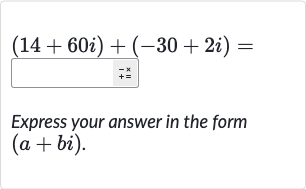AI tutor
Full solution
Q. Express your answer in the form .
- Add real parts: Add the real parts of the complex numbers.The real part of the first complex number is , and the real part of the second complex number is .Add these two numbers together to get the real part of the sum.
- Add imaginary parts: Add the imaginary parts of the complex numbers.The imaginary part of the first complex number is , and the imaginary part of the second complex number is .Add these two numbers together to get the imaginary part of the sum.
- Combine results: Combine the results from Step and Step to express the sum in the form .The real part obtained from Step is , and the imaginary part obtained from Step is .Combine these to get the final answer in the form .
More problems from Composition of functions
QuestionGet tutor help

